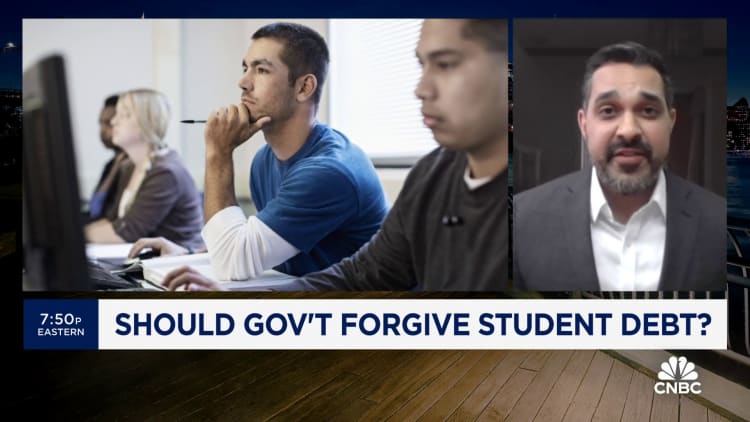Artisteer | Istock | Getty Images
It’s not unusual to hear people struggling with their student loan debt bemoan that they feel like they’ll be paying until they die. Which begs the question: What happens to the debt at that point?
It may be a question increasingly on people’s minds, as the number of older student loan borrowers trends upward. There were 2.8 million people 62 and older who still carried student loan debt in the second quarter of 2024, up from 1.7 million borrowers in that age cohort in 2017, according to new data from the U.S. Department of Education.
This isn’t just a risk for older borrowers, either. Some financial experts recommend that families take out life insurance — to cover any remaining debt — even on younger borrowers with private or co-signed debt. Additionally, if your loan doesn’t discharge, some experts suggest refinancing to add a discharge policy
“We have worked with many families that have suffered the loss of a loved one who held student loans,” said Betsy Mayotte, president of The Institute of Student Loan Advisors, a nonprofit.
Here’s what you need to know in such cases.
Federal student loans die with you
Fortunately, no one will be responsible for your federal education debt when you’re gone, said higher education expert Mark Kantrowitz.
“Federal student loans die with the borrower,” Kantrowitz said.
Any Parent PLUS loans will be discharged if the parent holding the loans dies, or if student for whom the parent borrowed dies, he added. Someone who has “endorsed” a Parent PLUS loan, which is similar to the co-signing process on a private loan, does not become responsible for the debt if the parent or student dies.
Those who’ve lost someone with student debt should ask the borrower’s loan servicer what proof they’ll need to discharge it, Mayotte said. (An original death certificate or a certified copy of the death certificate will likely be acceptable documentation, according to the U.S. Department of Education.)
While the family gathers this information, the borrower’s account should be placed on hold for 60 days, Mayotte said. If you’re unsure of the borrower’s loan servicer, you may be able to find out at Studentaid.gov.
“There are currently no taxes on this discharge, so the deceased’s estate would be free and clear of the debt,” Mayotte added.
With private student loans, responsibility is murkier
Some lenders of private student loans will cancel the debt if a borrower dies, but it is not guaranteed, Kantrowitz said. “About half of private student loans have a death discharge and about half do not,” he said. (On Kantrowitz’s website, PrivateStudentLoans.guru, he tries to keep track of different lenders’ policies.)
If the lender doesn’t offer a death discharge option, anyone who has co-signed on that loan can be held liable, Mayotte said. Even if there is no co-signer, there can be situations in which the deceased person’s estate would be held responsible for the private student loan, she added.
“In no case would family members be liable outside of the estate,” Mayotte said.
Even if a lender doesn’t offer a death discharge, someone who co-signed the loan might want to call the company and explain your situation if it would be difficult to repay it, Kantrowitz said. If you have health issues or are on a fixed income, you’ll want to point that out, he added.
“The family should contact the lender’s ombudsman to ask for a compassionate review,” Kantrowitz said. “The lenders don’t want bad press.”
More from Personal Finance:
How to find out how big your Social Security benefits may be
IRS issues final rules for inherited IRAs
How kids from rich families learn about money
A number of states have passed protections for co-signers of private student loans, and it’s worth checking what rights you might be entitled to, experts add.
Maine Senate Majority Leader Eloise Vitelli, a Democrat, sponsored the state’s Student Loan Bill of Rights, which went into effect in 2019. The death of a woman with student loans prompted that legislation, Vitelli said. The woman’s parents reached out to Vitelli’s office, seeking help.
“They had a horrific story to tell about having co-signed their daughter’s student loans, not really knowing what they were getting into,” Vitelli said. “And then she died, and they were still being hounded by the loan servicer.”
— Additional reporting by Genna Contino.
Correction: Mark Kantrowitz’s website is PrivateStudentLoans.guru. An earlier version misstated the website’s name.
Credit: Source link




